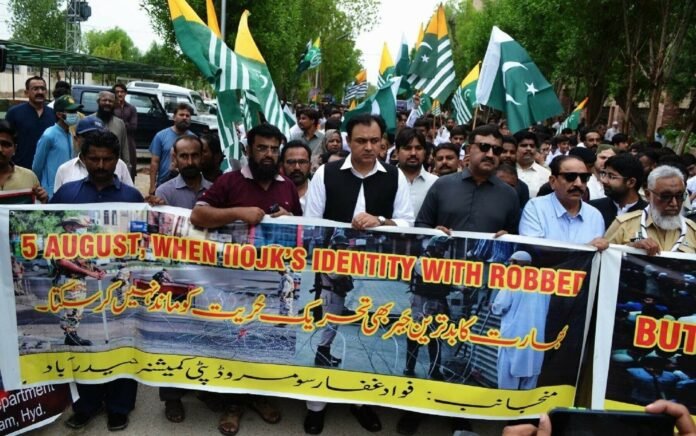Thousands march in solidarity with Kashmiris as Pakistan commemorates Youm-i-Istehsal with protests, seminars, and government-led events denouncing India’s 2019 abrogation of Article 370.
Thousands of people across Pakistan took to the streets on Tuesday to mark the sixth anniversary of India’s revocation of Jammu and Kashmir’s special constitutional status. Observed as Youm-i-Istehsal (Day of Exploitation), the day was marked by rallies, marches, seminars, flag ceremonies, and speeches, reaffirming Pakistan’s unwavering support for the people of Indian-occupied Jammu and Kashmir.
The Indian government’s move on August 5, 2019, to revoke Articles 370 and 35A of its constitution stripped the region of its limited autonomy and set off a wave of repression, curfews, media blackouts, arrests, and human rights violations. Since then, Pakistan has commemorated the day annually to express solidarity with the oppressed Kashmiris and to denounce what it calls India’s illegal annexation of the disputed territory.
This year’s events drew particularly large crowds, with a strong presence from civil society, political leaders, students, labor unions, and human rights activists. In Karachi, thousands joined a major rally from Peoples Chowrangi to Mazar-i-Quaid, waving Pakistani and Kashmiri flags and chanting anti-India slogans. Prominent ministers including Syed Nasir Hussain Shah, Saeed Ghani, and Syed Zulfiqar Ali Shah addressed the crowd, condemning India’s ongoing occupation and praising Pakistan’s diplomatic and military leadership for keeping global attention on the Kashmir issue. They emphasized the roles of Field Marshal General Asim Munir and Foreign Minister Bilawal Bhutto-Zardari in strengthening Pakistan’s position on Kashmir internationally.
Mushaal Hussein Mullick, wife of jailed Kashmiri leader Yasin Malik, paid her respects at the Quaid’s mausoleum and delivered a heartfelt speech at the University of Karachi. She highlighted the human suffering in the region and called for stronger international advocacy and awareness, urging young Pakistanis to raise their voices for Kashmir on global platforms.
Elsewhere in Sindh, similar demonstrations took place in Larkana, Qambar-Shahdadkot, Sukkur, Jacobabad, Khairpur, Umerkot, and Badin. Schoolchildren, teachers, government officials, and citizens joined together in peaceful marches, displaying banners, posters, and signs in support of Kashmir. In Khairpur, a rally led by Deputy Commissioner Fayyaz Rahujo and SSP Hassan Sardar Niazi saw participation from over 60 public and private organizations. At the end of the rally, participants observed a minute of silence to honor the martyrs of Kashmir.
In Sukkur and Jacobabad, large rallies drew citizens from all walks of life. Slogans such as “Kashmir Banay Ga Pakistan” and “We Stand With Kashmir” echoed through the streets as demonstrators marched past landmarks and government buildings. Similar scenes unfolded in Umerkot, Kunri, Samaro, Badin, and other towns, where rallies moved through major roads and gathered in front of press clubs and public squares.
The commemorations were not limited to Sindh. Protests and solidarity events were also held in Punjab, Khyber Pakhtunkhwa, Balochistan, Gilgit-Baltistan, and Azad Jammu and Kashmir. Political and religious parties set aside their differences for the day, issuing unified statements calling for the United Nations to intervene and for the world to pressure India to honor its international commitments.
In schools and colleges across the country, special assemblies and discussions were held to educate students on the historical and legal aspects of the Kashmir dispute. Social media campaigns gained traction as hashtags like #YoumEIstehsal2025 and #FreeKashmir trended nationwide.
As the sun set, a sense of national resolve and unity prevailed. In a statement, Pakistan’s Prime Minister reiterated that the country would never turn its back on the people of Kashmir and would continue to stand by them until they achieve their right to self-determination. For the people of Pakistan, Youm-i-Istehsal served not only as a day of protest, but as a solemn reminder that the struggle of Kashmiris is far from over—and that their pain is deeply shared across the country.





















